
March 26, 1944 – A well deserved break at a rest camp
March 26, 2024
March 28, 1944 – Sometimes you hear shells coming, sometimes you don’t on Anzio
March 28, 2024‘Dogface’ Hero: Headstrong Teen Becomes Highly Decorated Young Leader (Feb 2024 — ARMY magazine)
An article, ‘Dogface’ Hero: Headstrong Teen Becomes Highly Decorated Young Leader , based upon my and Mike Yorkey’s book, At First Light: A True World War II Story of a Hero, His Bravery, and an Amazing Horse, was published in ARMY magazine last month (February 2024).

You can read the article here.
Dogface’ Hero: Headstrong Teen Becomes Highly Decorated Young Leader
Walt Larimore
ARMY magazine, February 2024, Volume 74, Number 2, pp. 28-30
Posted Online Wednesday, January 31, 2024
Growing up in the 1930s in Memphis, Tennessee, Philip Larimore Jr. was the ultimate Boy Scout—able to read maps, put a compass to good use and traverse wild swamps and desolate canyons. While visiting relatives’ farms, the youngster found great joy in hunting, fishing and, most of all, caring for and riding horses.
His father taught him to shoot guns, and, by his sixth birthday, Phil could knock corn kernels off a fence post with a .22-caliber rifle at 25 yards. He was a daring lad and even swam back and forth across the Mississippi River during flood stage.
But Phil did poorly in school and became somewhat of a discipline problem, leading his parents to send him to high school at Gulf Coast Military Academy, Mississippi, where his innate gifts and talents, as well as his leadership skills, blossomed during his teen years.
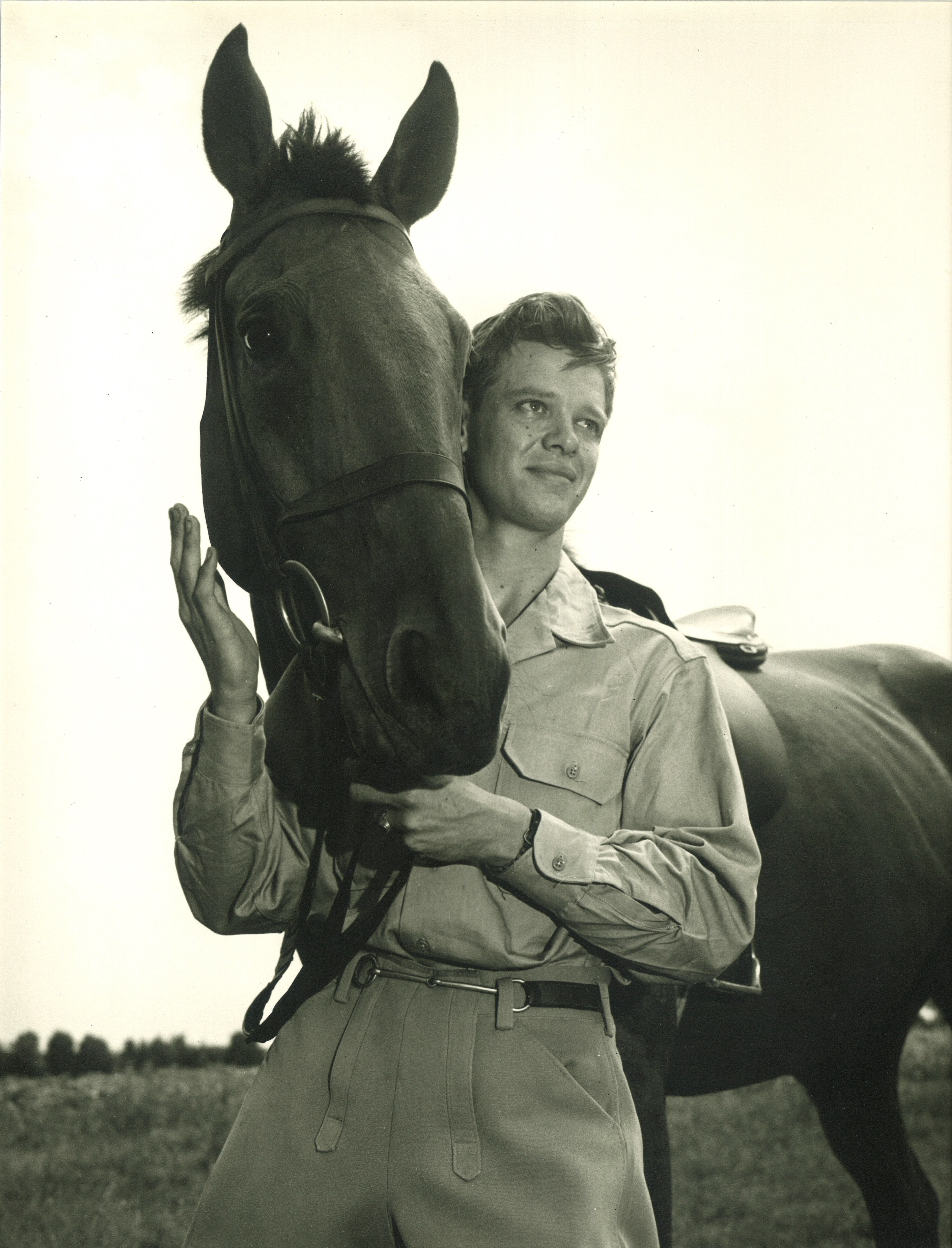
Retired Maj. Philip Larimore Jr. and his horse, Chugwater, in Charlottesville, Virginia, circa 1950. (Credit: courtesy of Walt Larimore)
Drums of War
As a 17-year-old, Phil graduated with honors from Gulf Coast Military Academy and its advanced ROTC program just after the December 1941 attack on Pearl Harbor, then became one of the youngest graduates of the U.S. Army’s Officer Candidate School at Fort Benning, Georgia, now known as Fort Moore. He was commissioned as a second lieutenant in the Army and received the Boy Scout’s Eagle Scout award just days after his 18th birthday, becoming the youngest commissioned Army officer of World War II.
After completing over 10 months of infantry specialty training with the 326th Glider Infantry Regiment, 82nd Airborne Division, including obtaining glider pilot wings, a parachutist badge and certification as a demolitions expert and an expert marksman, Larimore entered World War II in January 1944 as a replacement second lieutenant. He boarded a Liberty ship that sailed for nine days through the U-boat-infested North Atlantic to French Morocco before shipping out to the beachhead at Anzio, Italy.
There, he found he had been assigned to the 3rd Battalion, 30th Infantry Regiment, 3rd Infantry Division. He was put in charge of an ammunition and pioneer platoon doing field engineering work. At the front, Larimore and his soldiers often had to join their comrades in skirmishes. Regular forays into no man’s land and facing nearly point-blank enemy fire every night resulted in Larimore receiving his first valor award—the Silver Star.
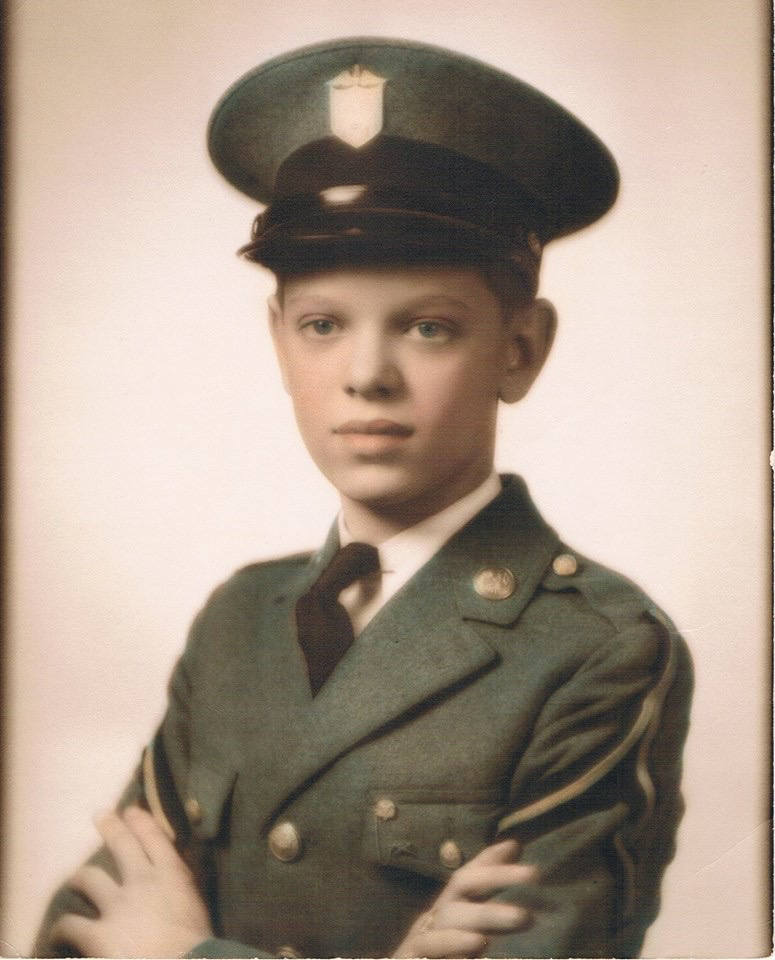
Larimore as a freshman at Gulf Coast Military Academy, Mississippi. (Credit: courtesy of Walt Larimore)
After breaking out from Anzio, liberating Rome, then training for the 3rd Infantry Division’s fifth amphibious D-Day in southern France (following Morocco, Sicily, Salerno in Italy and Anzio), Larimore and his men fought through southern France and into the Vosges mountains, where Larimore was severely wounded. He recovered in a field hospital alongside future Medal of Honor awardee Audie Murphy.
During the fall battles of 1944, Larimore received a second Silver Star, a Bronze Star and two Purple Hearts, and his units received two Presidential Unit Citations. On Christmas Eve 1944, as a 19-year-old first lieutenant, he returned to the 3rd Infantry Division for bitter winter fighting in the Colmar Pocket in France. He took over command of Medal of Honor recipient Maurice “Footsie” Britt’s Company L, 3rd Battalion, 30th Infantry Regiment, 3rd Infantry Division.
As for Larimore, his bravery on the battlefield resulted in another Bronze Star, the French Croix de Guerre with palm and the French Fourragere, and his unit was awarded a third Presidential Unit Citation.
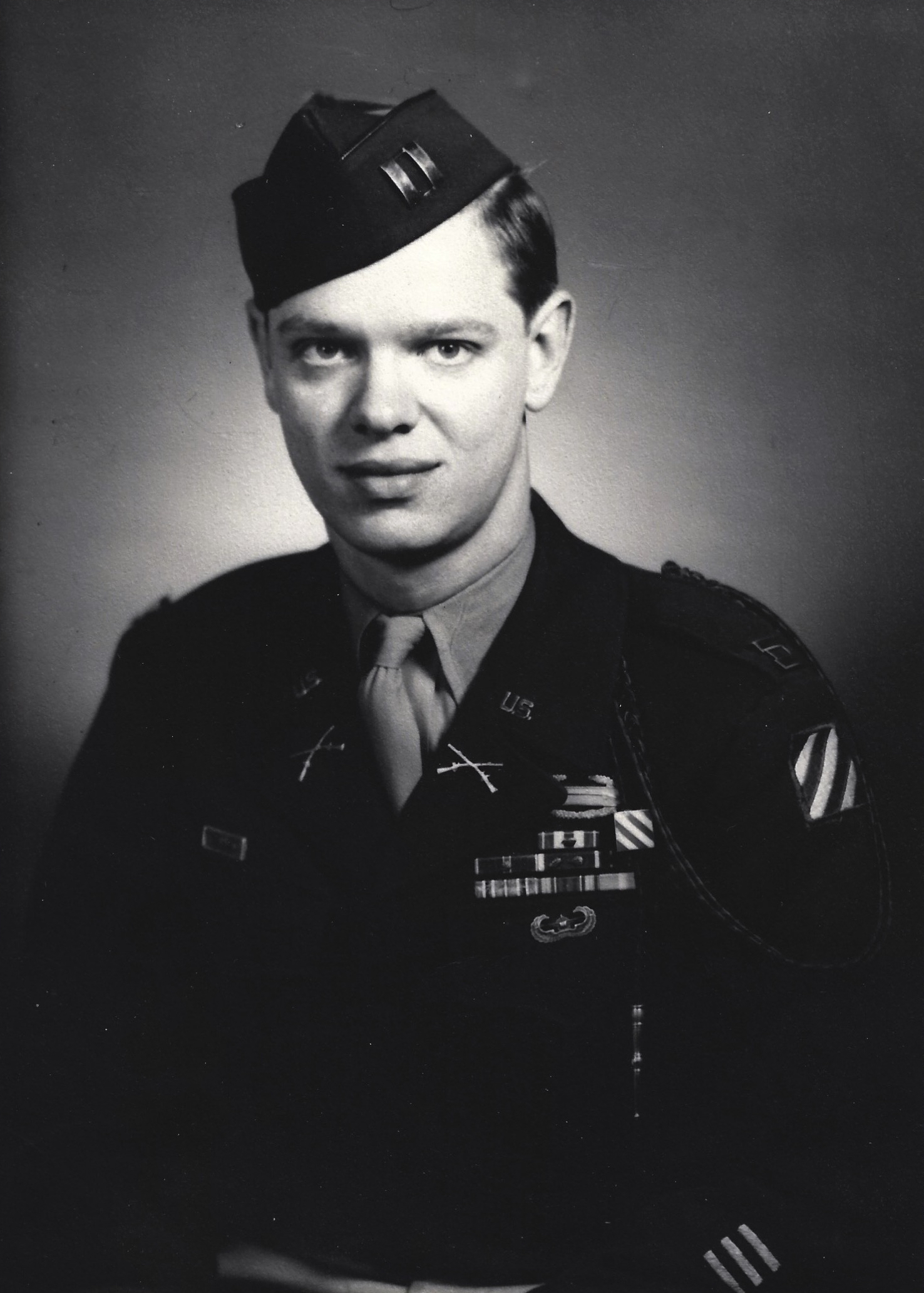
Capt. Larimore circa 1947. (Credit: courtesy of Walt Larimore)
More Acts of Bravery
After celebrating his 20th birthday, Larimore and his men battled across the Rhine River and the Siegfried Line into Germany. During a two-day “respite” in early April 1945, after 15 months at the front, Larimore was sent on a solo, top-secret mission via a Piper Cub aircraft into Czechoslovakia to find the world-famous Lipizzaner horses that Germany’s Nazi dictator Adolf Hitler had hidden away. The successful completion of the mission resulted in Lt. Gen. George Patton Jr. authorizing Operation Cowboy, which saved the Lipizzaners.
Then, on April 8, 1945, a month before V-E Day, Larimore was leading his company in an attack near Rottershausen, about 100 miles east of Frankfurt, Germany. In a hail of bullets and hand-to-hand fighting, Larimore killed a German officer at point-blank range and seized his company’s objective.
When a company scout patrol became surrounded, Larimore climbed onto the turret of a Sherman tank and led a force to relieve the patrol. Facing suffocating enemy fire, Larimore eliminated three machine-gun nests and dozens of enemy troops. Sniper bullets struck his helmet twice and his canteen once.
Running out of ammunition for his .50-caliber machine gun, he leaped off the tank and engaged the enemy from the ground with his M1 Garand rifle and was severely wounded by a dumdum bullet that shattered his right tibia. An eyewitness reported that a captured German officer stated “that his men were demoralized at the appearance of the man on the tank that bullets could not stop.”
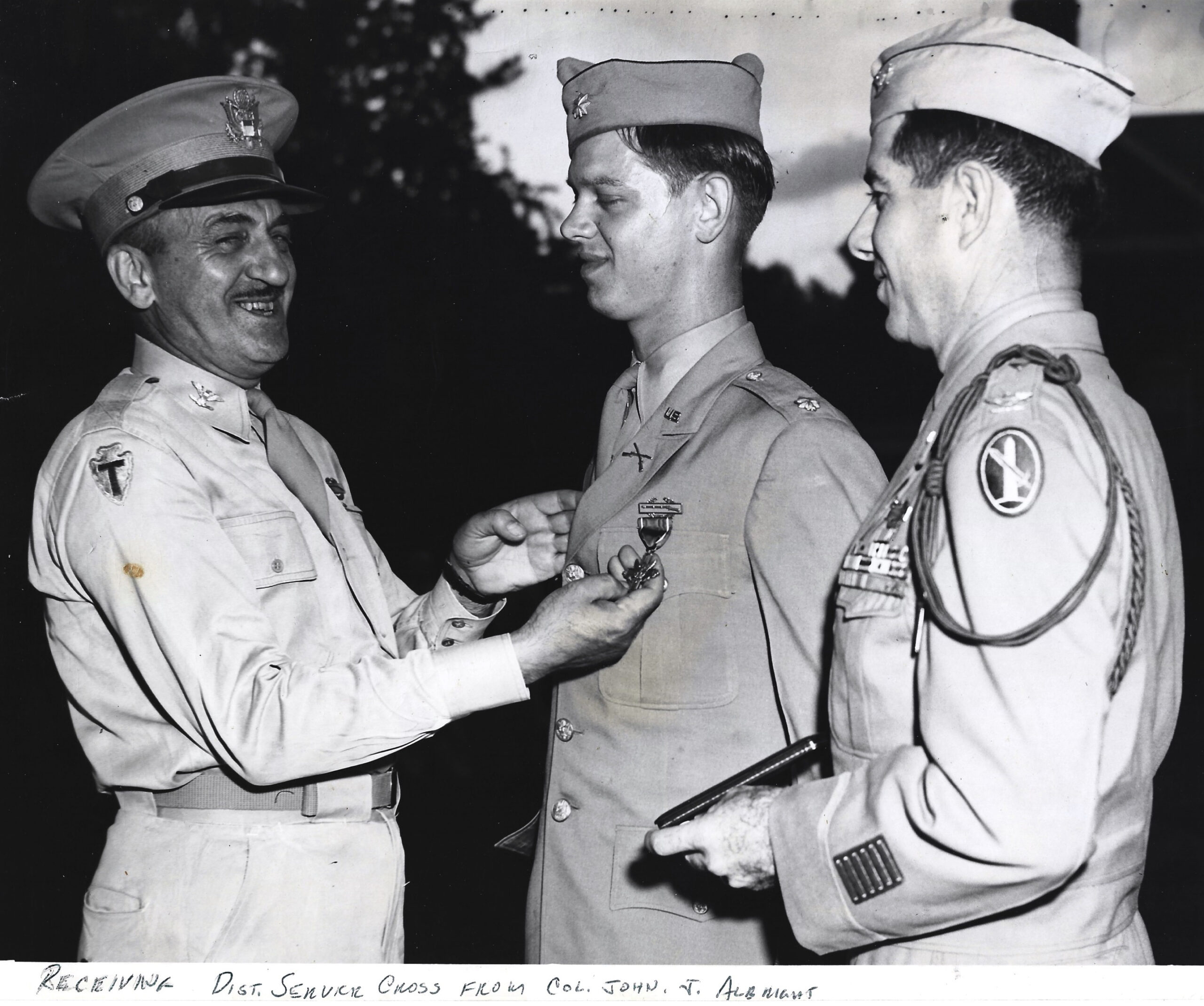
A 22-year-old Maj. Larimore receives the Distinguished Service Cross from Col. John Albright, post commander at Fort Myer, Virginia. (Credit: courtesy of Walt Larimore)
Not Done Fighting
Larimore saved his scout patrol soldiers but lost his right leg, leading to a year of recuperation at Lawson General Army Hospital in Atlanta. During that time, Larimore received his third Purple Heart and his second Silver Star. He also helped initiate an equine therapy program at the hospital, reportedly one of the first such programs at an Army medical facility.
But after his hospital discharge in May 1946, Larimore kept fighting. He took on the War Department’s policy that Army officers who were amputees must be discharged from service.
Presidential Friend
While fighting his battle to stay in the Army, his former commander, then-Col. Lionel McGarr, post executive officer at Fort Myer, Virginia, hired Larimore to be his executive officer. During this time, Larimore also was befriended by President Harry Truman and Gen. Dwight Eisenhower, with whom he played bridge weekly. He also was supported in his quest by two of his former 3rd Infantry Division leaders: then-Maj. Gen. John “Iron Mike” O’Daniel and then-Brig. Gen. Robert Young.
Nevertheless, on April 15, 1947, Larimore lost his appeal to stay in the Army by the Army Retiring Board’s 3–2 vote. This led to an honorable discharge on July 12 and medical retirement as a 22-year-old major.
For his actions that saved his scout patrol but almost cost him his life, Larimore was awarded the Distinguished Service Cross and a parade by the Military District of Washington and the 3rd U.S. Infantry Regiment (The Old Guard).
Larimore later took advantage of the GI Bill to complete undergraduate and graduate school at the University of Virginia. He became a professor of cartography at Louisiana State University and a nationally recognized and well-published cartographer, as well as a Boy Scout leader for over 40 years. He married and raised four boys.
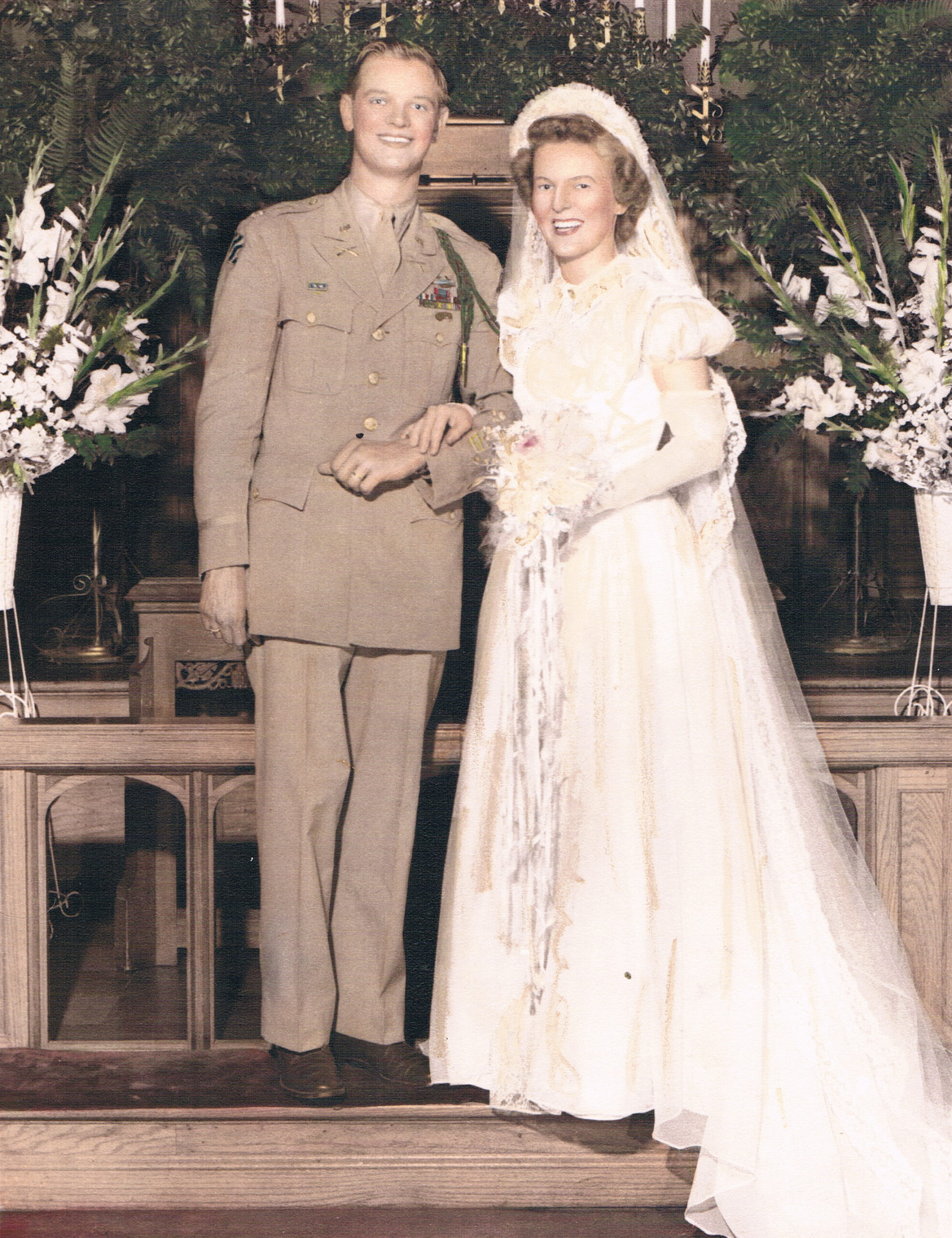
Philip Larimore Jr. with his bride, Maxine Wilson, at their wedding in Memphis, Tennessee, in June 1949. (Credit: courtesy of Walt Larimore)
Larimore died on Oct. 31, 2003, at the age of 78. He is interred with his wife, Maxine, at Port Hudson National Military Cemetery near Baton Rouge, Louisiana.
On Aug. 1, 2023, the 3rd Infantry Division posthumously inducted Larimore into its Marne Hall of Fame along with four men he deeply admired and under whom he served: Gens. George Marshall, Eisenhower, O’Daniel and McGarr.
Larimore was proud to have served as a “Dogface Soldier” with the 3rd Infantry Division.
I remember visiting Larimore’s grave. My eyes welling up with tears, I whispered, “Dad, I always loved being your son. Now more than ever, I’m honored by it.” And I’m pleased to share his story with you.
Those of us who have never served in the military do not say “Thank you” often enough to those serving or those who have served on our country’s behalf.
* * *
Walt Larimore is a family physician in Colorado Springs, Colorado. He received his medical degree from the Louisiana State University School of Medicine. He is the author or co-author of over 40 books, including At First Light: A True World War II Story of a Hero, His Bravery, and an Amazing Horse. His website and blog can be found at https://drwalt.com.

In case you haven’t read or listened to Dad’s book, you can learn more or order it here.
© 2024 Association of the United States Army
Additional Information about Dad’s 3rd Infantry Division not in the article:
Phil Larimore was extremely proud to have been a Dogface Soldier with the 3rd Infantry Division. He was part of the World War II exploits of the Division that added even greater glory to the Marne Legends of World War I by participating in five D-Days and more than 900 days in the war, of which 531 were days in combat—the most combat days of any unit in the ETO—while fighting over 3,200 miles across seven countries.
It was units of the 3rd Infantry Division that captured Hitler’s retreat near Berchtesgaden, not the Band of Brothers. The Division was not only among the first American combat units to engage in offensive ground combat operations in World War II, but it was also the only U.S. unit that served in all 10 campaigns of the ETO.
While doing so, the 3rd ID suffered the most casualties of any U.S. unit with between 25,000 to 30,000 causalities. Finally, 39 Division soldiers were awarded the Medal of Honor, one-fourth of all Medals of Honor presented during the war. Furthermore, 133 DSCs and more than 2000 Silver Stars were awarded to Dogface soldiers, leading some historians to call the Division the most honored in the Army.
I remember visiting Phil Larimore’s grave. With my eyes welling up with tears of gratitude, I whispered, “Dad, I always loved being your son. Now more than ever, I’m honored by it.” And I’m pleased to share his story with you. Those of us who have never served in the military do not say thank you often enough to those serving or those who have served on our country’s behalf.
© Copyright WLL, INC. 2024. This blog provides healthcare tips and advice that you can trust about a wide variety of general health information only and is not intended to be a substitute for professional medical advice, diagnosis, or treatment from your regular physician. If you are concerned about your health, take what you learn from this blog and meet with your personal doctor to discuss your concerns.



